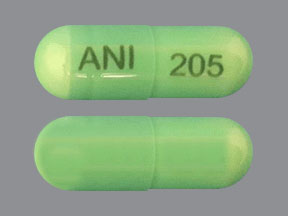
Nicardipine Coupons & Savings Card – Discount Prices from $222.10
Nicardipine is a medication used to manage high blood pressure and certain types of chest pain, known as angina. By reducing high blood pressure, this medication helps prevent complications such as strokes, heart attacks, and kidney issues. Nicardipine is classified as a calcium channel blocker, working by relaxing the blood vessels to allow blood to circulate more easily. This action not only helps control blood pressure but can also alleviate chest pain. It is important to take Nicardipine regularly for optimal effectiveness, though it is not suitable for immediate relief of chest pain attacks; other medications like sublingual nitroglycerin should be used for that purpose. Nicardipine is available in both oral capsule forms and as an intravenous infusion, typically administered by healthcare professionals in cases where oral administration is not feasible. Common side effects may include swelling of the feet, flushing, headache, and dizziness. Always consult with your healthcare provider for guidance specific to your health needs before starting any new treatment.
Our coupons are free to use. Before paying, show the pharmacist your Nicardipine savings card to get your free discount. Use our filters below to edit the prescription box to match your needs. The Nicardipine prices will update based on your prescription needs. Above our Nicardipine coupons, you can change your location to see pharmacy prices and costs in other areas. We're here to help you buy Nicardipine at the lowest price with our prescription discount card.
My prescription
Edit
20MG, Nicardipine (180 Capsules)
Select pharmacy

CVS
$222.10
COUPON PRICE
Albertsons
$253.68
COUPON PRICE
Walgreens
$266.40
COUPON PRICE
Walmart
$2226.21
COUPON PRICENicardipine savings card
Show this card to your pharmacist
CVS
$222.10
BIN
ID
PCN
GRP
019876
LH53BF6A5D
CHIPPO
LHX
Powered by
Nicardipine is a medication used to manage high blood pressure and certain types of chest pain, known as angina. By reducing high blood pressure, this medication helps prevent complications such as strokes, heart attacks, and kidney issues. Nicardipine is classified as a calcium channel blocker, working by relaxing the blood vessels to allow blood to circulate more easily. This action not only helps control blood pressure but can also alleviate chest pain. It is important to take Nicardipine regularly for optimal effectiveness, though it is not suitable for immediate relief of chest pain attacks; other medications like sublingual nitroglycerin should be used for that purpose. Nicardipine is available in both oral capsule forms and as an intravenous infusion, typically administered by healthcare professionals in cases where oral administration is not feasible. Common side effects may include swelling of the feet, flushing, headache, and dizziness. Always consult with your healthcare provider for guidance specific to your health needs before starting any new treatment.
Our coupons are free to use. Before paying, show the pharmacist your Nicardipine savings card to get your free discount. Use our filters below to edit the prescription box to match your needs. The Nicardipine prices will update based on your prescription needs. Above our Nicardipine coupons, you can change your location to see pharmacy prices and costs in other areas. We're here to help you buy Nicardipine at the lowest price with our prescription discount card.
Related calcium channel blockers prescriptions
coupons from$23.74Save 46%
coupons from$136.39Save 75%
coupons from$124.20Save -32%
coupons from$52.83Save 76%
coupons from$165.15Save -18%
coupons from$508.24Save 72%
coupons from$22.09Save 42%
coupons from$643.71Save 72%
More prescriptions for hypertension
coupons from$226.89Save 72%
coupons from$17.71Save 92%
coupons from$7.02Save 91%
coupons from$18.60Save 74%
coupons from$66.15Save 38%
coupons from$15.56Save 75%
coupons from$20.94Save 91%
coupons from$54.77Save 48%
Related calcium channel blockers prescriptions
Cardizem Save 46%coupons from $23.74
Nimodipine Save 75%coupons from $136.39
Verelan Save -32%coupons from $124.20
Conjupri Save 76%coupons from $52.83
Isradipine Save -18%coupons from $165.15
Norliqva Save 72%coupons from $508.24
Tiazac Save 42%coupons from $22.09
Katerzia Save 72%coupons from $643.71
More prescriptions for hypertension
Coreg Cr Save 72%coupons from $226.89
Nifedipine ER Save 92%coupons from $17.71
Quinapril Save 91%coupons from $7.02
Spironolactone Save 74%coupons from $18.60
Acebutolol Save 38%coupons from $66.15
Benazepril Save 75%coupons from $15.56
Enalapril Save 91%coupons from $20.94
Amiloride-hydrochlorothiazide Save 48%coupons from $54.77
Nicardipine dosage forms
Use our Nicardipine 20MG coupon with prices from $222.10 for 180 Capsules. You can also use our Nicardipine 20MG coupon with prices from $116.20 for 90 Capsules. We have a Nicardipine 20MG coupon with prices from $570.20 for 500 Capsules. You can use our Nicardipine 30MG coupon with prices from $144.46 for 90 Capsules.
Dosage Quantity Price from Per unit 20MG 180 Capsules $222.10 $1.23 20MG 90 Capsules $116.20 $1.29 20MG 500 Capsules $570.20 $1.14 30MG 90 Capsules $144.46 $1.60 30MG 500 Capsules $719.20 $1.44
| Dosage | Quantity | Price from | Per unit |
|---|---|---|---|
| 20MG | 180 Capsules | $222.10 | $1.23 |
| 20MG | 90 Capsules | $116.20 | $1.29 |
| 20MG | 500 Capsules | $570.20 | $1.14 |
| 30MG | 90 Capsules | $144.46 | $1.60 |
| 30MG | 500 Capsules | $719.20 | $1.44 |
